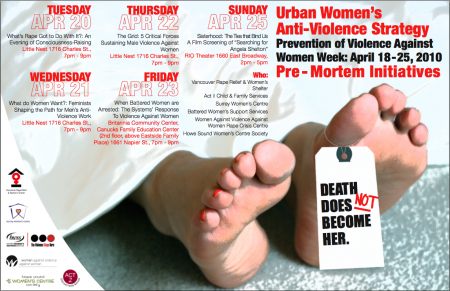STORY about SolidarityGenderpublié le Avril 22, 2010 by fazeelajiwa
Death Does Not Become Her: The Second Night
How can men be involved in the women’s anti-violence movement?
Death Does Not Become Her: The Second Night
How can men be involved in the women’s anti-violence movement?
Wednesday evening was the second night of a week-long series of events hosted by a new coalition of women’s groups, the Urban Women’s Anti-Violence Strategy. This coalition is comprised of independent women’s groups from the lower mainland who have joined together to criticize the Solicitor General’s Domestic Violence Action Plan for focusing the province’s resources on risk assessment and a death review panel, both of which take place after violence has already occurred. The Urban Women’s Anti-Violence Strategy calls for recognition of the essential role that independent and equality seeking women’s organizations play in ending the systemic inequalities that perpetuate violence against women.
Last night’s discussion focused on the ways in which men could be involved in fighting for women’s equality through the anti-violence wing of the women’s liberation movement. The discussion featured a roundtable of representatives from Battered Women’s Support Services, Surrey Women’s Centre, Vancouver Rape Relief and Women’s Shelter, and Women Against Violence Against Women. Each organization involves men in different ways, from fundraising alliances and public education projects to allowing men decision making power in a board of directors.
One of the organizers of the week, Angela Marie MacDougall (executive director of Battered Women’s Support Services) opened the night by saying “it is a tremendous honour to gather for the first discussion among this configuration of feminists to shape the path for men’s involvement in anti-violence work.” She identified that even while working together to gain equality, men’s power and privilege is always present and must be grappled with.
Considering the professional training that the Solicitor General’s action plan will provide to police and ministry workers, many of whom are male, this is a critical time for feminist anti-violence workers to develop and assert their analysis about when the use of male power and privilege can be useful to the fight for equality, and when it can be problematic or even dangerous. MacDougall commented on the fact that this week in Victoria, Jackson Katz (a well known gender violence activist) has been invited to speak to an elite group of professionals about men’s involvement in the anti-violence movement. “The feminist analysis that we can provide is necessary, especially when the government has not thought out the complications [of involving men]. All the groups in our alliance have brought men into our work in a thoughtful way that involves the women who are part of our work – so we think there is value in hearing the things we have to say and allowing our work to inform the government’s direction.”
What is that feminist analysis?
“These policy interventions continue to see violence against women as individual and unique acts. Tonight’s conversation reinforced that violence against women is not a series of individual ‘bad guys,’ but a force that entrenches inequality between women and men. Our call tonight is for men to ally with the force of women’s resistance,” says Jacqueline Gullion, a collective member from Vancouver Rape Relief and Women’s Shelter.
The participants agreed that men who want to be involved in anti-violence work must follow feminist leadership. That means using male power and privilege to sustain the frontline work of rape crisis centres and transition houses, rather than splitting public attention and funds with men’s public education and awareness campaigns. “Women’s groups have fought hard to keep the limited funding we have, and men’s anti-violence work must not take away from that,” argues Leslie Lewis from Act 2 Safe Choice. In terms of the provincial action plan, Stephanie Reifferscheid from Women Against Violence Against Women thought that “men with large amounts of power who make decisions at the provincial level should be using this privilege to involve women, so we can have influence over issues that affect us.”
“My challenge to men who want to end violence against women is to do more than raise awareness,” Gullion says. “I want men to act in practical support of women’s liberation.”
Some feminists have advocated for a non-professional response to women who have experienced sexist violence, which moves the emphasis away from assessment criteria and onto empathy that comes from a shared experience of oppression. Rape crisis workers in women’s organizations have been independently organizing to save women’s lives since feminists invented transition houses nearly 40 years ago as an alternative to relying on protection from the criminal justice system.
So the issue again becomes one of spending money in the right places. “Training the professionals is not required,” Gullion says. “What is required is a major policy shift that requires all levels of government to respond immediately under the Criminal Code and Attorney General’s existing policies on wife assault. And it requires funding for rape crisis centres – research from the Canadian Association of Sexual Assault Centres shows that women who call them are emboldened, that they learn what they are entitled to from the state (after an attack), and are more likely to succeed in getting criminal and social justice services to come through.”
Instead of spending public funds on professional training, the Solicitor General could immediately insist on funding for independent women’s centres so that women can have what we need to resist inequality, not only stop the violence.
Fazeela Jiwa is an independent journalist that also works with VRRWS.
The site for the Vancouver local of The Media Co-op has been archived and will no longer be updated. Please visit the main Media Co-op website to learn more about the organization.
